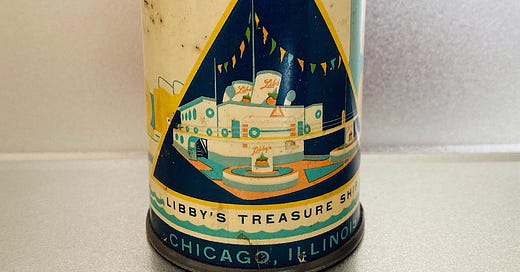THE WORLD’S FAIR BANK
“For a whimsical optimist like Dad, the fair was heaven. He made it live that way in my imagination too.”
In August 2009, my father, an optometrist, was out on his morning walk when he was struck and killed by a driver with no peripheral vision. On top of our sudden, deep grief, my brother and I were quickly subsumed by police investigations, insurance inquiries and disagreements with our father’s new family.
Dad had begun dating less than a year after my mother died, as his voted-most-popular-in-high-school personality emerged from mourning. Women swarmed about him. He fell in love and married, but her family and ours did not mesh well and predictable problems arose.
For months after Dad’s funeral, it was unclear when, if ever, we would be able to retrieve his belongings; finally, after lawyers negotiated, we were granted three hours to comb through his things on a designated November afternoon. They may have been the saddest three hours of my life—certainly worse than the funeral—his possessions displayed in a musty garage as though it were a tag sale.
Here were Dad’s jazz albums, and there his saxophones, and stacked high on rented banquet tables were the decades of our family pictures and slides (my mother stretching salt water taffy on a Kodachrome boardwalk; Dad clowning in a Colonial Williamsburg stockade; Dad turning an oblong matzoh fragment into a Groucho cigar; so much joking, always jokes). And then, miraculously, there was my holy grail: a jar filled with his 1939 World’s Fair collection—keychains, fobs, World of Tomorrow binoculars and, at the bottom, this Libby’s Treasure Ship tin-can bank, rusted shut, no way to retrieve whatever it might hold.
For my entire childhood, the little bank hid in the top center drawer of Dad’s bureau, alongside his 1950 fraternity paddle, his pharmacist father’s mortar and pestle and other treasured artifacts. Were my parents aware I was a spy, regularly rooting through their things? I always made sure to replace the bank at the top of the pile, as Dad did, so the most-treasured artifact would be what he saw first when he opened the drawer.
The ’39 Fair was a touchstone of my father’s life, the source of perhaps his most vivid childhood memories, and I was steeped in its lore from a young age. When I worked beside Dad in his basement darkroom, he’d share stories: his astonishment at first seeing the Trylon and Perisphere punctuating the Queens horizon; the wonders that free Cokes and free candy were to Depression-era kids. Fast rides in the Amusement pavilion, buildings in shapes never seen before—it was as if the children were in charge. For a whimsical optimist like Dad, the fair was heaven. He made it live that way in my imagination too.
If you shake the Libby’s bank, you can tell there’s paper inside, maybe a ninth-birthday dollar from Uncle Moe or notes Dad jotted to himself or cartoons torn from the Sunday funny pages and slid through the coin slot. The bank can never be opened or the thin enameled tin would crack. Our father left us suddenly and violently. Destroying the bank is inconceivable. It’s the thing I’m looking for when I dream about Dad’s bureau drawer full of mismatched socks and secrets. I keep it on my desk, but sometimes I hold it to my ear like a seashell, wondering what my father is still trying to tell me.
—Martha Greenwald

Martha Greenwald is the founding director of The WhoWeLost Project and the editor of Who We Lost: A Portable COVID Memorial (Belt Publishing).
For a different reading experience, The Keepthings’ stories can also be read in their entirety on Instagram @TheKeepthings.
Have a story to share? Please see the complete submission guidelines, including photo guidelines, at TheKeepthings.com.






"His possessions displayed in a musty garage as though it were a tag sale"--this is heartbreaking. But your dad's optimism shines through.
I love the lists of photos and objects and finally the find. The imagination you share with a whimsical optimist.